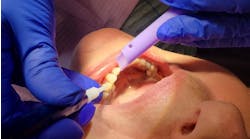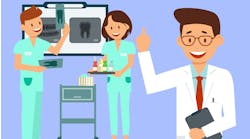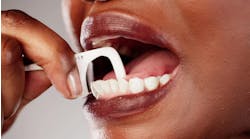1. Delivers consistent results with excellent patient related outcomes.
One key benefit of a dental laser is the consistent results. This includes minimal discomfort for the patient as well as decreasing the amount of time a patient is expected to be in the chair. For example, Waterlase dental lasers are cleared for numerous dental applications that can be performed on both pediatric and adult patients. This specific laser is precise and accurate, providing very acceptable results. After being treated with the laser, patients frequently return expressing they had much less postoperative pain, bleeding, and swelling than they anticipated. This is highly valuable as many cite pain as the source for dental phobia, which keeps them from returning for treatment.
2. Ability to perform procedures with increased comfort to patients
Dental lasers allow for a more streamlined process of care and are more comfortable than treatments performed with “traditional devices.” Moreover, since most procedures today can be augmented by laser technology, dentists can provide more comprehensive care in-house, which can help grow the practice.
3. A versatile and effective piece of technology
Dental lasers are extremely versatile, which is beneficial to both patients and providers alike. Dental professionals with little exposure to the comprehensive attributes may subscribe to the belief that the technology is limited to a few procedures, such as a gingivectomy or biopsy. The diode lasers can certainly perform these procedures (with minimal to no hemorrhage and excellent postoperative healing), but the scope of dental lasers offers much more.
Diode soft tissue lasers, for example, are excellent for troughing around crown preparations (without requiring a retraction cord). And they can perform frenectomies, crown lengthening (respecting biologic width), and such nonsurgical periodontal procedures as laser bacterial reduction and curettage, oral ulcer management, and the desensitization of teeth.
Taking into consideration all tissue lasers, the versatility of the Er,CR :YSGG (Erbium laser) allows for the preparation of teeth from Class I to V, with minimal to no local anesthesia needed especially with deciduous teeth, depending on the patient’s condition. Since these lasers have an affinity for hydroxyapatite and water, we can now perform surgical periodontal procedures that include the alteration of boney topography and gingivae.
What’s more, zirconium veneers and crowns can be removed easily without cutting the materials. And titanium implant surfaces can be decontaminated when we encounter peri-implantitis.
4. Dentists with dental lasers are in high demand
As many patients become more aware of the advances in health care available today, it’s not surprising they are now expecting the same options when it comes to their dental care. In fact, the niche technology of dental lasers creates an attraction. A practice that utilizes laser technology can separate itself and generate patient-demand due to safety and convenience measures, as well as superior results. Dentists beginning a practice must have a niche to separate themselves in a competitive market. Data suggests that there is less aerosol production with lasers and thus can provide the patient with a sense of a safe environment.
5. Increases practice revenue
All the benefits above directly impact the bottom line. From the increased efficiency to higher quality of patient care, dental lasers can virtually pay for themselves. Dentists must adopt value added revenue. Lasers increase the number of procedures performed in a dental office. Additionally, due to the decreased pain and fear associated with laser technology, patients are more apt to maintain and pursue preventative care visits.






